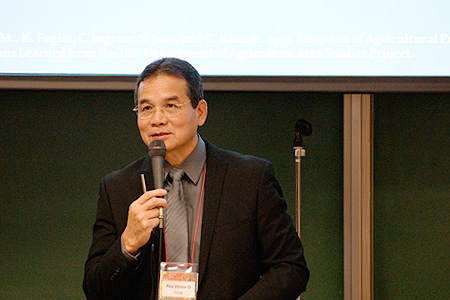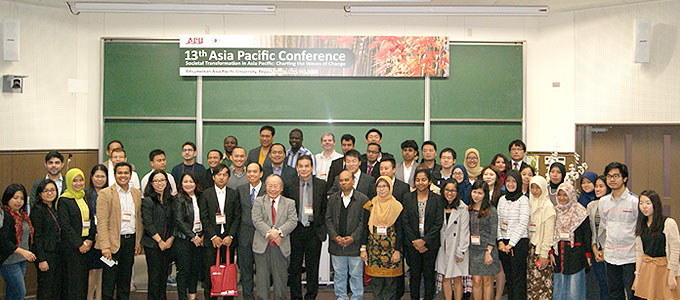The "Asia-Pacific Conference 2015" hosted by the Ritsumeikan Center for Asia Pacific Studies (RCAPS) was held from November 7 (Sat.) - 8 (Sun.), 2015.
Based on the theme of "Societal Transformation in Asia Pacific: Charting the Waves of Change," about 300 visitors, the largest number ever attended the conference, including about 200 presenters from about 20 countries and regions, such as Argentina, Australia, Thailand, Bangladesh, Canada, China, Germany, Hungary, India, Indonesia, Iran, Japan, Korea, Taiwan, Malaysia, Philippines, Sweden and the U.S.
Dr. Rex Victor O. Cruz a Nobel Peace Prize winner in 2007, gave a keynote speech titled "Holistic Transformation: Key to Ecosystem Resiliency in a changing World," where he proposed a process on what should be done for the ecosystem to recover in the future, at a time where the ecosystem is being destroyed drastically, caused by the continued destruction of the environment around the world.
He explained that the earth is under stress that it has never experienced before, which will become even more conspicuous through climate change, and introduced effects caused by mankind on the natural environment with a United Nations report. He brought up the issue that it is taking too long to take actual measures, after the factors that are harmful to the environment and people became clear.
Regarding how to save the earth, he explained that it is necessary to consider and take measures on what individuals can do for neighbors, not for themselves. Attendees from each country and region at the venue seemed to be earnestly listening to his speech.
At this conference, 38 panel sessions were conducted based on this theme for two days. In this conference, panel sessions in Japanese which were not held in recent years, and presentations given by APU undergraduates were conducted.
* The "Asia-Pacific Conference" has been hosted by the RCAPS since 2003, for the purpose of "creating the future shape of the Asia-Pacific region," which is one of the fundamental principles of APU.












